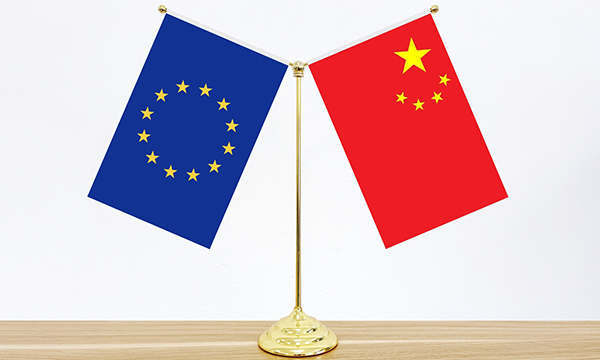HE Zhigao: EU independence key to long-term China-EU ties

China EU Photo:VCG
The high-profile visit to China by French President Emmanuel Macron and European Commission President Ursula von der Leyen is seen by some US media as a major flaw in the foreign policy of the Biden administration and they try to drive a wedge between China and the EU in terms of practical cooperation.
Some people even believe that the successive visits of European leaders to China are "kowtowing" to trade with China, abandoning "more important priorities" such as human rights and international security. This is different from France's view that the China-France meeting is particularly crucial, as China shares common interests with the EU in the peaceful settlement of the Ukraine conflict, as well as deepening practical economic and trade cooperation and other areas.
China believes that the visit of European leaders to China will continue the positive momentum of close high-level interactions between China and the EU by the end of 2022, and will effectively reduce the EU's misunderstandings and misgivings about China, increase strategic mutual trust and strengthen the autonomy of China-EU relations.
The Ukraine conflict that broke out in February 2022 not only profoundly changed the security order in Europe, but also continued to affect the prospects of global economic development. As the US continues to stoke the situation, the EU and its member states are indirectly participating in the conflict, increasing the difficulty of Europe's independent construction of future security order.
The international community should be fully aware that the Russia-Ukraine conflict can only be resolved through dialogue and communication, and the crisis can only be politically resolved through peace talks. On April 1, Macron and Ukrainian President Volodymyr Zelensky exchanged views on the current situation in Ukraine and proposed diplomatic efforts to hold a peace summit, which shows that Europe has not completely closed the window for dialogue with Russia.
Earlier in February, China issued its position paper titled "China's Position on the Political Settlement of the Ukraine Crisis," pointing out that dialogue and negotiation are the only viable solutions to the Ukraine crisis and the international community should create conditions and platforms for the resumption of negotiation. This means that China and the EU have a consensus on resolving the conflict through negotiations.
Economic and trade cooperation is the closest bond of interests between China and Europe. China and the EU have great resilience and potential for cooperation in the fields of economics, trade, investment, energy transition and green development. According to statistics released by Eurostat, trade volume between the 27 EU countries and China reached 856.3 billion euros ($910.6 billion) in 2022, an increase of 22.8 percent compared to 2021.
The EU Doing Business Report 2022/2023 shows that China and the EU were each other's second largest trading partner and there are plenty of opportunities and space for cooperation between China and the EU.
Mutually beneficial trade and economic cooperation between China and the EU will not only activate dialogue and cooperation in various fields, but also bring more confidence to global prosperity and stability.
However, Europe is in deep economic trouble. The EU has imposed 10 rounds of sanctions on Russia, which has led to a "backlash effect" of sanctions and has plunged European countries into an energy crisis, with high inflation and further pressure on their economic recovery. The operating costs of European enterprises have doubled, and the converging trend of deindustrialization and industrial hollowing has strengthened.
After the US introduced the Inflation Reduction Act, Europe felt that it would destroy the level playing field between the two sides. In March 2023, the European Commission introduced the Net Zero Industries Act, which was seen as the EU's direct response to the US law.
At the same time, the EU seeks to wean itself off Chinese technology and raw materials and reduce economic dependence on China. The European side sees this as neither decoupling from China, nor taking sides in the competition between China and the US.
Therefore, against the backdrop of the global economic recession and drastic changes in the international landscape, it is necessary for China and the EU to support and cooperate with each other, in particular to strengthen the positive aspects of China-EU practical economic and trade cooperation, and work together to maintain the stability and security of industrial and supply chains.
For a long time, whether China-EU relations are subordinate or independent of China-US relations has been a key topic of debate in the academic and political arena. China has always emphasized that China and Europe are the two major forces for maintaining world peace, the two major markets for promoting common development, and the two major civilizations for promoting human progress. China-EU relations have an endogenous driving force for cooperation and development.
Europe's independent understanding of and policy toward China are key to the steady and long-term growth of China-EU relations. In the context of the overall decline of the West, Europe's strategic autonomy will be further lost if closely following the pace of the US, Europe's influence on the international landscape will further decline, and China-EU relations may face new challenges and difficulties.
Following a series of visits to China by European leaders, China and the EU will strengthen consultations on some regional hotspot issues, jointly address global challenges, consolidate the foundation of cooperation in economic and green transition, deepen mutually beneficial cooperation in various fields, and strengthen the independence and resilience of China-EU relations.
He Zhigao, Associate Research Fellow at the Institute of European Studies, Chinese Academy of Social Sciences.
The article was originally published in Global Times on April 6, 2023.
